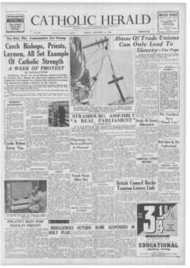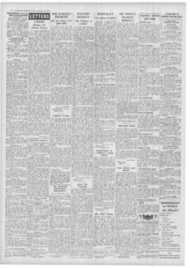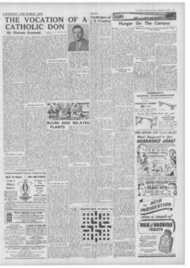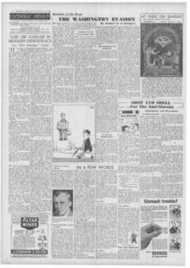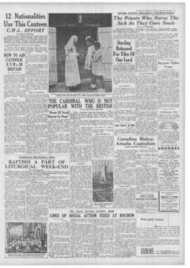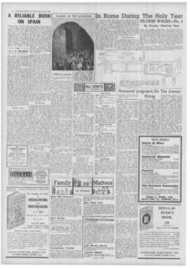Page 3, 16th September 1949
Page 3
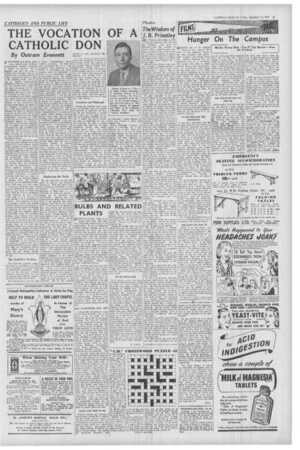
Report an error
Noticed an error on this page?If you've noticed an error in this article please click here to report it.
Tags
Share
Related articles
Hundred Per Cent.
The Catholic Press A Growing Force In Britain
The Conversion Of Iceland Is Slow
Column I 7
Canons Celebrate
THE VOCATION OF A CATHOLIC DON
By Outram Evennett
A HUNDRED and twenty years have passed since Catholic Emancipation enabled Catholics to return to political life in England and little less than a hundred since the first removal of
religious tests at Oxford and Cam bridge reopened the doors to them in the academia world. Yet it is only as recently (comparatively speaking) as fifty to sixty years ago that the Catholic Press would still have been discussing, not the -role and influence of Catholics in the universities, but whether they could be allowed to be there at all. True, the universities in this context would have meant Oxford and Cambridge only, for Catholics had never been debarred by any ecclesiastical admonition from taking the degrees of the " godless" University of London, a fact often used by Cardinal Manning and others to demolish the arguments of those who, before the change of attitude on the part of the ecclesiastical authorities in 1895, pleaded the necessity of Oxford and Cambridge degrees for Catholics. That the work of Catholic dons not only in London and the provincial universities but also in Oxford and Cambridge should now be a recognised part of the Catholic contribution to public life shows how far we have moved since the end of the nineteenth century.
Catholics in the universities, both senior and junior members, form one comparatively small religious group within academic societies in which an absolute freedom of thought and expression reigns and which are consequently characterised by a thousand varied opinions and beliefs, organised and unorganised. Such diversity and the intellectual stimulus which it provokes, though products of the last hundred years and established only since the disappearance of the former Anglican orthodoxy and monopoly, are now generally regarded in England as hall-marks of the true university atmosphere. A Catholic university—and there are many in the world—is not practical politics in England today. But however effectively such an hypothetical institution might teach the widest range of subjects at university level, the necessary theological orthodoxy on which its life would be based and which from the Catholic standpoint would constitute its main value, would cause it to be regarded by many outside it as a contradiction in terms. Circumstances, however, have brought it about that English Catholics make their contribution to academic intellectual life not through an institution of their own, which indeed might have unhappy effects in producing social and academic divisions along religious lines such as are sometimes found on the continent, but by joining in the life of the existing non-denominational universities. both of old and new foundation, where they can take their place on terms of equality and where an intellectual cross-fertilisation can occur that is of mutual benefit to all parties concerned. While it is vain, and indeed perhaps undesirable in the present world, to expect from the universities as such anything in the nature of a positive lead in intellectual principles or moral inspiration, they are nevertheless sources from which powerful forces for good can, and should, emerge. Among these forces Catholicism can be one.
The Catholic's Position
Two important questions suggest themselves in considering the position of Catholics in any given social or professional environment. First, how is the individual Catholic affected? And secondly, how can his presence, as a Catholic, produce an effect on the around him?
The business of a university don is partly " contemplative," partly
"active," in nature. He leads an inner intellectual life of a " contemplative " kind inasmuch as the pursuit of knowledge and understanding, either by specialised research or by concentrated thought on one subject or by wide reading and synthetic thinking—but helped always by teaching activities—is, or should be, his basic occupation. Such exercises of the mind can perhaps only in a few highly technical and practical subjects be indulged in without the largest questions of religion, philosophy and ethics presenting themselves — and not, perhaps, always in the precise formulae of the theological textbook. This, of course, is a private matter for each man or woman; but it cuts, no doubt, both ways for the Catholic that this mental-spiritual activity (which I have veotured to refer to as " contemplative") is carried on in a society which, though containing perhaps more good men of high Christian belief and principles than is sometimes imagined, is yet predominantly sceptical or non-believing in atmosphere. A realisation of the infinite varieties and powers and activities of which the human intelligence is capable reveals a truth about the world that cannot be ignored; while the fact that—in England at any rate— men of the most varied views on fundamental matters can live, think, teach and carry on university business in personal friendship, and even intimacy, is surely a valuable even if ultimately an illogical phenomenon. That there have been instances of loss of Faith at the universities by both senior and junior members cannot be denied, but of what walk of life cannot this be said? Whether the academy or the world carries the more dangerous occasions for Faith is an open question that was hotly, if inconclusively, debated in the 19th century. At bottom it is probably a question ma! posee.
Displaying the Faith But the universities are not only places of research and individual cerebration. God help them if they ever become so exclusively or even primarily! They are also places of education in which there is a relationship of pupil and teacher— though not of schoolboy and schoolmaster — between dons and undergraduates. While there is much truth in the aphorism that undergraduates learn but are not taught, yet it is also true that in addition to their own reading and discussions they receive, no doubt in varying measure, formative influences from their seniors through lectures, personal contacts, and, at Oxford and Cambridge, the regular private colloquies known as " tutorials" on the banks of the Isis and as "supervision " on those of the Cam. Unquestionably the first duty of a Catholic don. from which he must never allow himself to be deflected, is to do his job as well as he can— whether as lecturer, tutor, bursar. administrator, writer, or whatever it may be. But in lecturing and teaching. in social contacts with undergraduates as well as with his fellow-dons, how far can he (or she) pursue a more self-conscious Apostolate? No orthodoxy Of method or outlook is imposed on university lecturers in this country save that of dutiful adherence to the highest standards of accuracy and relevance; and complete candour in discussion, as well as the genuine attempt to appreciate other people's points of view, is of the essence of university life. There is no reason why— eschewing all unnecessary or knockme-down polemics—the Catholic attitude to life or to a given subject should not be conveyed in the university in terms appropriate to the university, and by the methods
natural • to each individual's temperament. •
To boys coming up from Catholic schools the experience of Oxford or Cambridge reveals the existence of an immense range of learning, ideas. personalities, among which, at a highly impressionable and indeperndently-minded age (as a wise chaplain will realise) they must seek to preserve and perhaps think out again their bearings. But to many more than have lost their Faith there, Oxford and Cambridge have been the places in which they have found it—either by the deepening of an inherited allegiance or by conversion. It is therefore the duty of Catholics in the universities to display the Faith. And here again it is undergraduates who can do most with their fellows.
Urquhart and Bullough Among the relatively small number of Catholics who have figured prominently in university life during the past half-century, I should like to pick out the names of Iwo who gave shining examples of service to others—the one at Oxford, the other at Cambridge; the one a born Catholic, the other a convert in middle life; both men of high intellectual powers and deeply
rooted, regular, piety. For more than thirty years Francis Fortescue Urquhart was an outstanding personality in Oxford. In his rooms in Balliol and in the annual summer gatherings in his chalet in Savoy. he radiated a powerful and persuasive influence over generations of Oxford men, Catholics and non-Catholics alike. No man was ever less of a controversialist. Problems of organisation did not interest him. He published extremely little and felt no urge of authorship. Yet through his lectures and tutorials, more perhaps through his friendships and stimulations, most of all, undoubtedly. through his personality and example he did incalculable good
and exercised a lasting influence on many now eminent in public and academic life.
Edward Bullough, Professor of Italian at Cambridge, was a very different type of man. With all a convert's zeal to be up and doing he flung himself into the work of Catholic student organisations in England and their affiliation to analogous bodies abroad, infusing vitality and zest wherever he intervened. As well as this, the Catholic Chaplaincy in Cambridge largely owes its present home to his zeal and drive, while the presence of Dominicans in Cambridge is due to his bequest of his home to the Order. Two personalities, two lifeworks more in contrast could hardly be imagined; but both deserved supremely well of Church and university alike and have set the highest examples for their successors.
blog comments powered by Disqus


